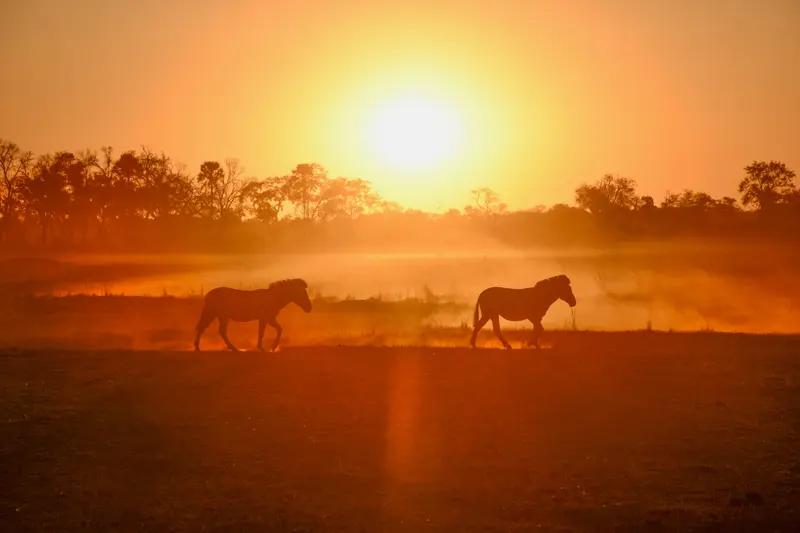A Real Head Scratcher
Murchison Falls National Park, Uganda
There are two things I find myself wondering every single time I’m in Africa.
1. The first is why their sunsets are so consistently beautiful, and what makes them so unbelievably, distinctively red?
2. And the other is, why don’t we carry more things (or any things, really) on top of our heads in America?
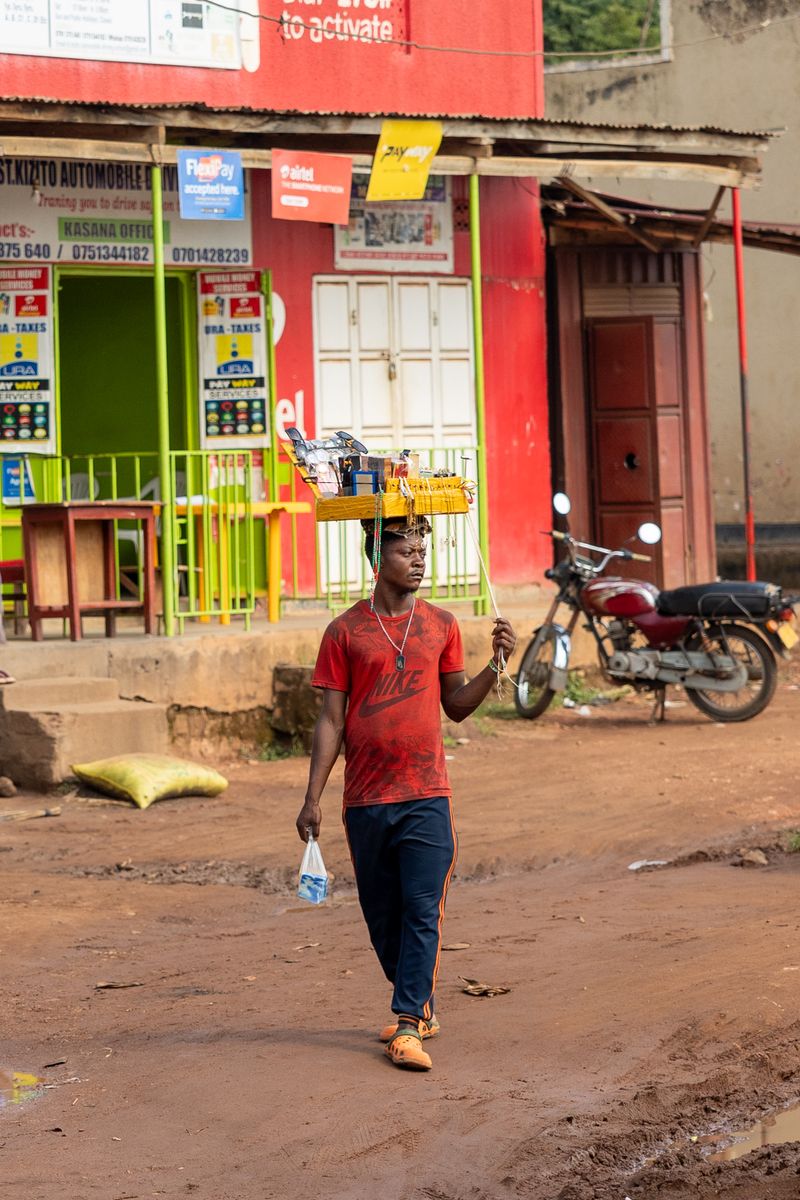
I could probably do some research and find out the scientific or anthropological answer to both of these two things, and yet… I’m not sure I actually want to!
Each of these two things, the blood red sunsets and the abundance of people with objects balanced gracefully atop their heads, these are both so beautiful to me, and so quintessentially “African,” that they contribute to the overall mystique and allure of the place. I simply can't imagine Africa any other way, and so I’m not sure I’m ready to unearth some terrible truth that will forevermore tarnish their appeal.
Could I ever look at Africa the same if I found out it was untold amounts of air pollution that causes their uniquely red sunsets? Or that it’s perhaps a history of oppression, poverty, and subjugation that lead the African people to learn to carry things on their heads?
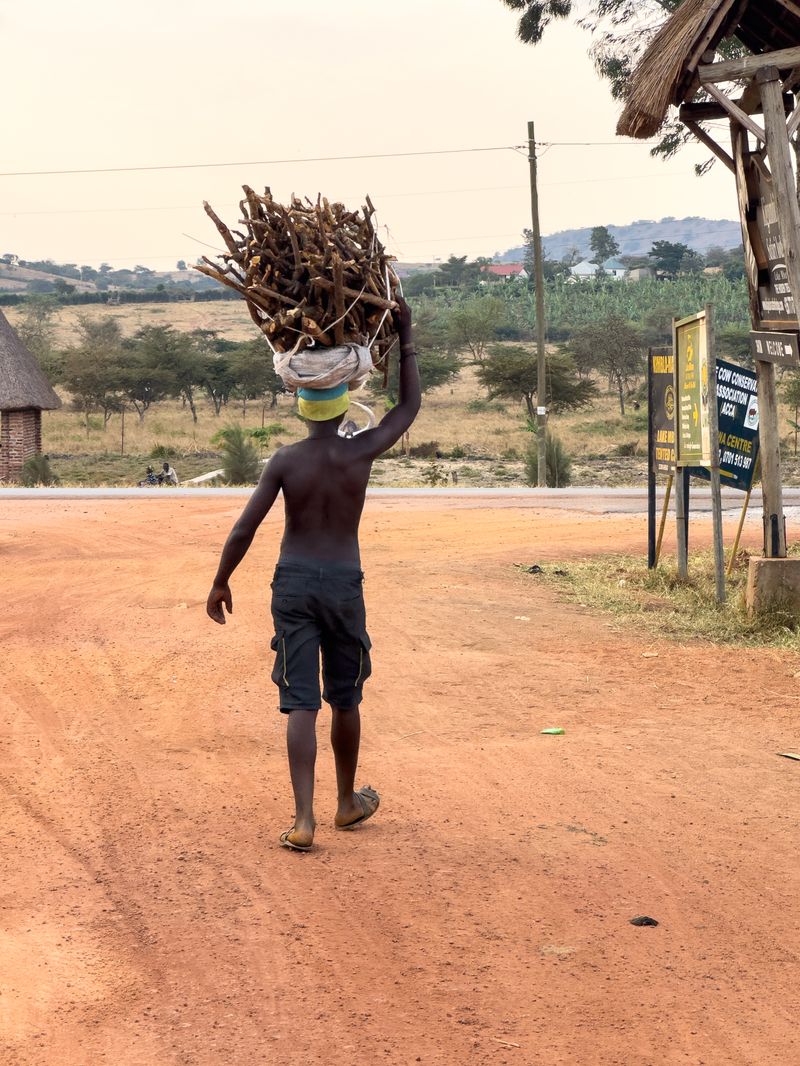
Leaving the sunsets behind for now, all I know is this: our abandonment of the human head in America, as a viable platform on which to balance and carry things, seems like a step in the wrong direction to me. We have left a whole method of conveyance there on the table, and it’s one that time and time again proves itself to be extremely useful!
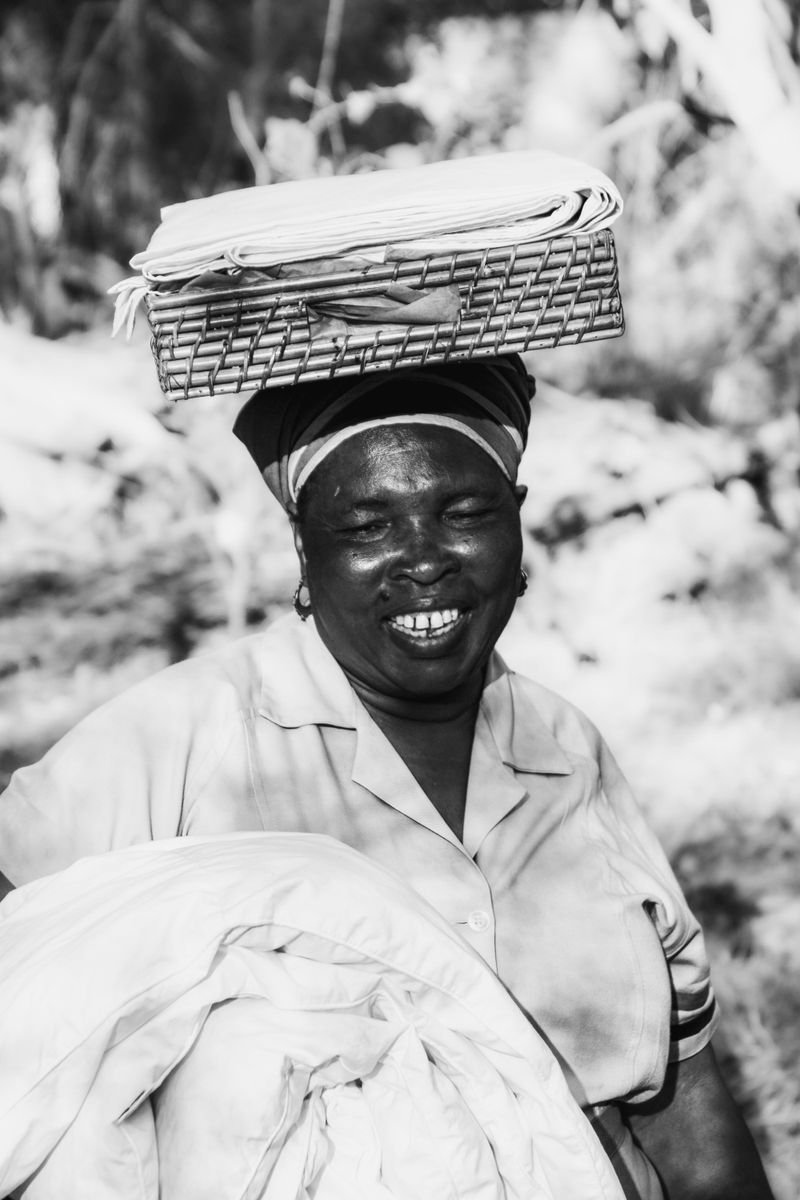
At home, I constantly find myself running out of hands when unloading groceries or work materials from my truck, and so the idea of being able to balance an additional item on top of my head is very appealing. Also, watching the people in Africa, I see that it often solves the problem of having to sit something down in the filthy dirt, or the inability to drag something behind you on wheels when a series of stair steps enter into the equation.
Whether it’s concerning photography or my family’s landscaping business or anything else, I am a firm believer of never asking someone to do something that you yourself are unwilling to try. Especially if it is a physically demanding task, like carrying camera equipment up a mountain or digging a large hole in the ground to plant a tree. I always want to have an understanding of what exactly is involved. Understanding the inherent difficulty of a thing helps to keep your expectations realistic. It also helps to inform you about how much a service is worth, and how much you should be willing to pay a person to perform that task in your stead.
Therefore, many years ago, when I first started traveling to Africa, I set out to try and learn how to carry things on my head. Granted, I was still heavily drinking at the time, so a task which intrinsically involves balance and coordination was unsurprisingly not improved by all the alcohol I was consuming, but I decided to give it a try nonetheless. In my useful “extra-hand-for-groceries” scenario, I always pictured that while unloading my car or whatnot, I might want to plop a small, manageable sack up on top of my head, and save myself an extra trip.
Well, after drunkenly working with the lovely and talented support staff of a safari lodge in Botswana, much to my dismay, we all learned together—quite quickly— that I wasn’t ready for “small, manageable sack.” In fact, after several embarrassing attempts at balancing just a basket on my head, the waitstaff demoted me to a short stack of bath towels. And then, when that proved too difficult, eventually just a single washcloth.
Balancing the washcloth on my head involved about the same level of skill and grace as wearing a yarmulka on your crown, yet sadly, I was even able to make the washcloth look precarious. I am therefore glum to admit that “washcloth” is where my head-carrying career plateaued.
Fast forward to many years later. I have no more experience with carrying things on my head than I did previously, however, what I do have is several years of sobriety under my belt. I figured this might be just the advantage I was missing all those years ago, and wondered if perhaps sober, my body would now instinctively understand all the necessary techniques and the coordination involved.
Spoiler alert, it didn’t.
But first, in my defense, let me explain that a few other very significant factors had changed as well. Gone were the days of towels and small baskets, because in believing my handicap to be solely alcohol related, I showed up to Uganda and immediately bit off more than I could chew.
Over the years, my arsenal of camera equipment has grown exponentially, and therefore, so has the weight of my suitcase. No longer is it a small, manageable duffle bag, now it has ballooned into a piece of luggage roughly the size and weight of a baby elephant.
So when I saw that the safari lodge porters intended to carry my unwieldy albatross on top of their heads, up several flights of stairs and all the way to my room, my sense of chivalry and guilt kicked in. Having just recently been embroiled in multiple debacles at multiple airports, all of which involved luggage scales and the excessive weight of my bags, I knew exactly how much my suitcases weighed. I am reluctant to even write the weight down here, for fear of coming across like a monster. That old mantra of never asking someone to perform a task that you haven’t attempted yourself swelled up inside me, and before I knew it, I was feeling obligated to at least give it a try myself. How hard could it possibly be to carry a huge and heavy piece of luggage on your head, when oftentimes the person doing this for me was less than half my size?
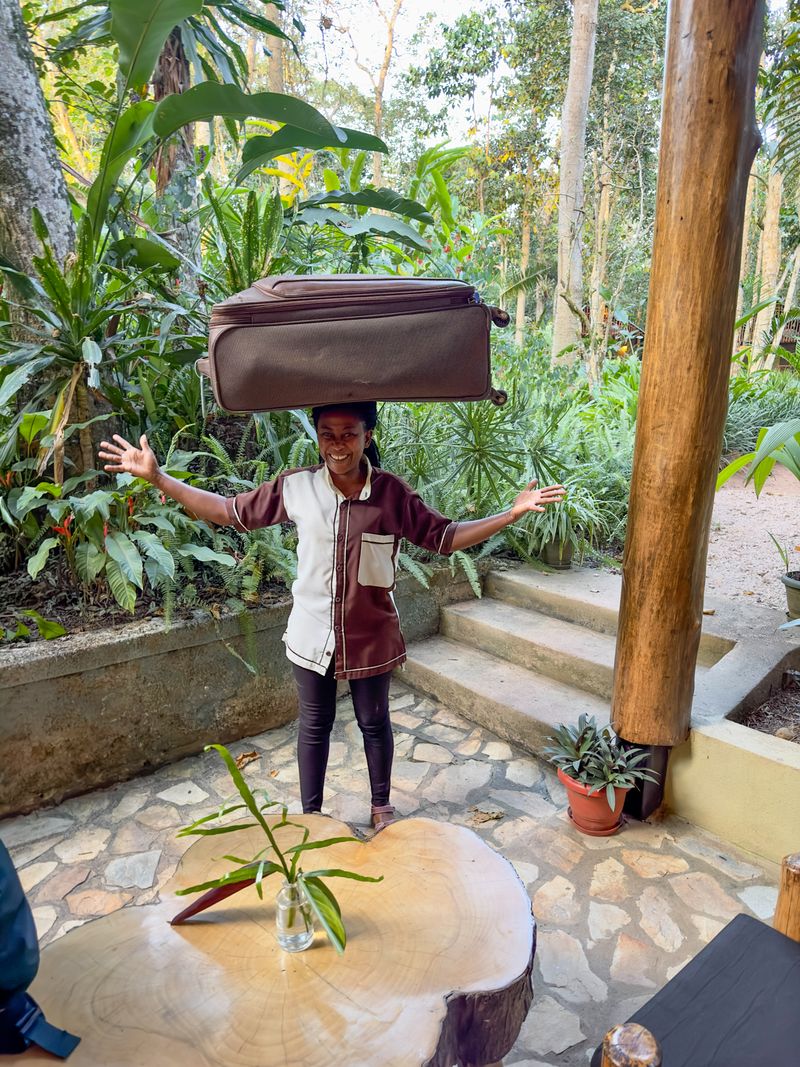
Note: I’ve abandoned any attempt to keep you wondering if maybe I eventually learned to carry my own luggage like this. Spoiler, I didn’t, these are all various people who ended up doing it for me.
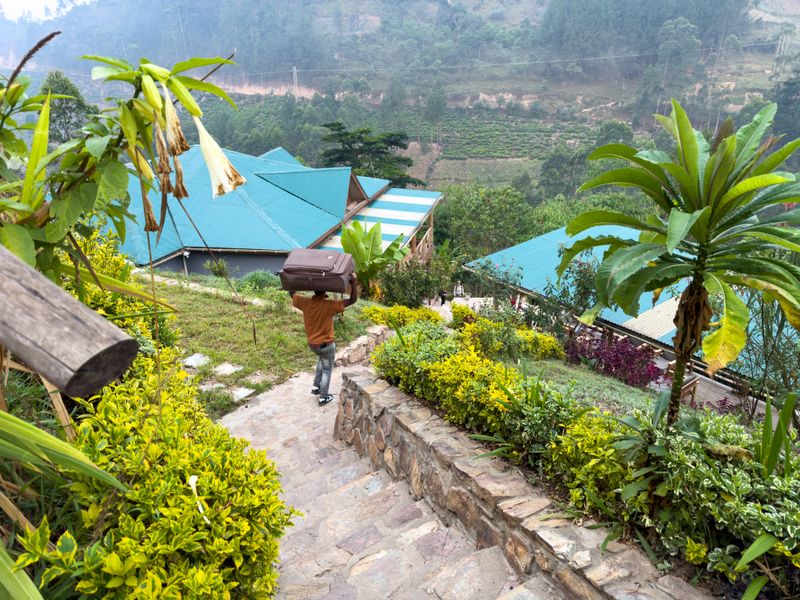
Ugh. Trying to attempt this sudden and untested bout of chivalry in the reception area of the safari lodge (rather than behind closed doors in a private and safe environment), turned out to be a misstep. Although I’m calling it chivalry, my attempt to lift up my suitcase —and then try and somehow manage to wrestle it skywards and onto the top of my tiny head— might have been closer akin to machismo. It was definitely ill-informed by the belief that alcohol consumption was the only thing preventing me from accomplishing this task before. I seemed to forget that carrying things on your head also involves a great deal of technique and skill.
The people of Uganda are often taught how to do this from a very young age, and they have had a lifetime of practice to work out the kinks. They make carrying things on your head look logical and effortless.
Then there’s me.
I guess I was emboldened by my previous success, years ago, with the washcloth? And maybe thought now that I was sober, I was ready to graduate from a small piece of fabric draped over my head like a limp hat, to a massive suitcase full of camera gear? Who knows.
But luckily for everyone involved— both the porters watching in disbelief and myself included— the whole catastrophe was relatively short-lived. In my attempt to launch the suitcase off the ground and up towards my head, my intended trajectory became contorted. By underestimating the object’s weight, the logistics of the procedure, and assuredly every other factor involved, I lost my balance almost immediately and had to be rescued. The porters rushed over to help me as soon as they could, but not before I managed to knock over a small table lamp in the process, as well as several other items that appeared to be made out of wicker.
All in all, I think we collectively learned many valuable lessons here. Namely, that you need to learn to walk before you run, and also that some people were meant to neither walk nor run -- at least not whilst simultaneously balancing large items such as a suitcase on their heads.
Additionally, I learned that it is very hard to damage objects made of wicker, and it’s probably why the safari lodge chose to place them out in the lobby in the first place, instead of things made from glass or other more delicate materials.
Even though everyone and everything, including the lamp, the porters, myself, and the wicker, all emerged from the ordeal unscathed, it’s possible my pride was a little scratched up. But I learned there is more than one way to use your head, and I can use mine by realizing there are some parts of understanding a culture that can, and probably should, remain forever foreign to me. And I'm okay with that.
I tell you one thing I know for sure, it’s going to be a quiet while before I attempt to conduct any research concerning the beautiful sunsets.
********************************
I know it's not a contest, but if it were, I'd say this woman I met in the Everest Region of Nepal definitely wins.
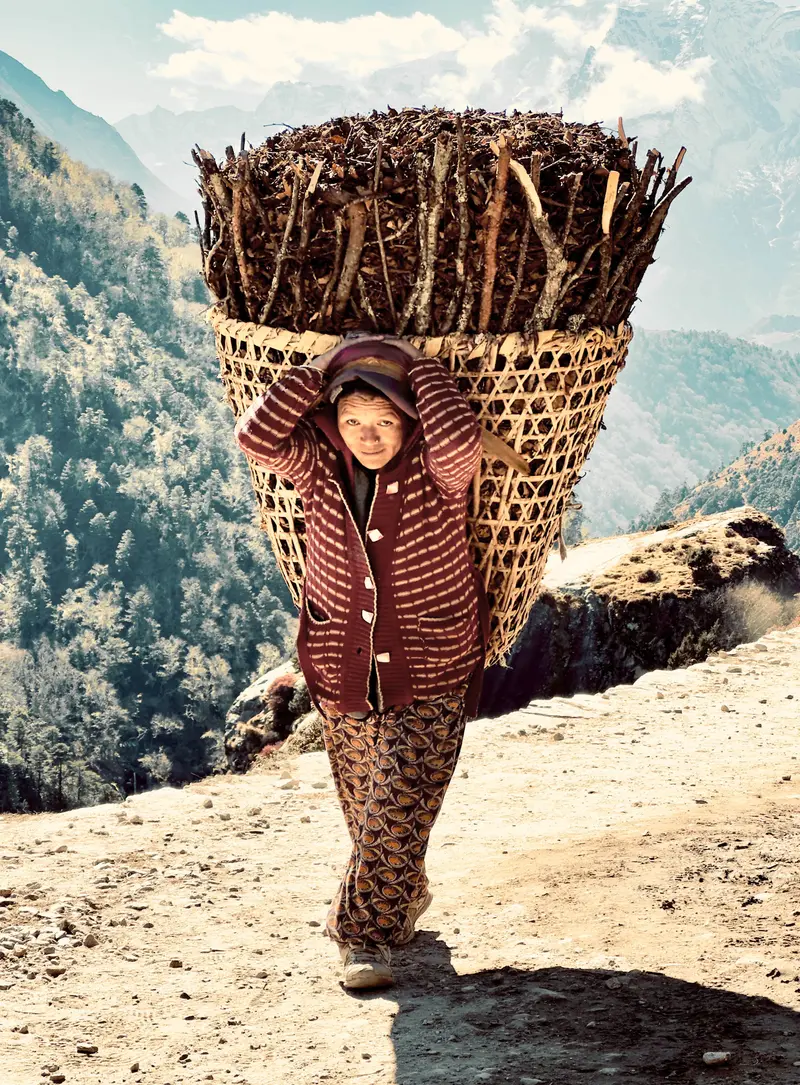
The air is so thin thanks to the altitude, that after reaching a certain elevation on the EBC, I'm embarrassed to admit I couldn't even manage to carry the weight of my puny little camera anymore. You can read about that debacle HERE and HERE!
Or, for a bit lighter fare, learn more about red African sunsets and play with these STRIPED AND MOHAWKED HORSES.
